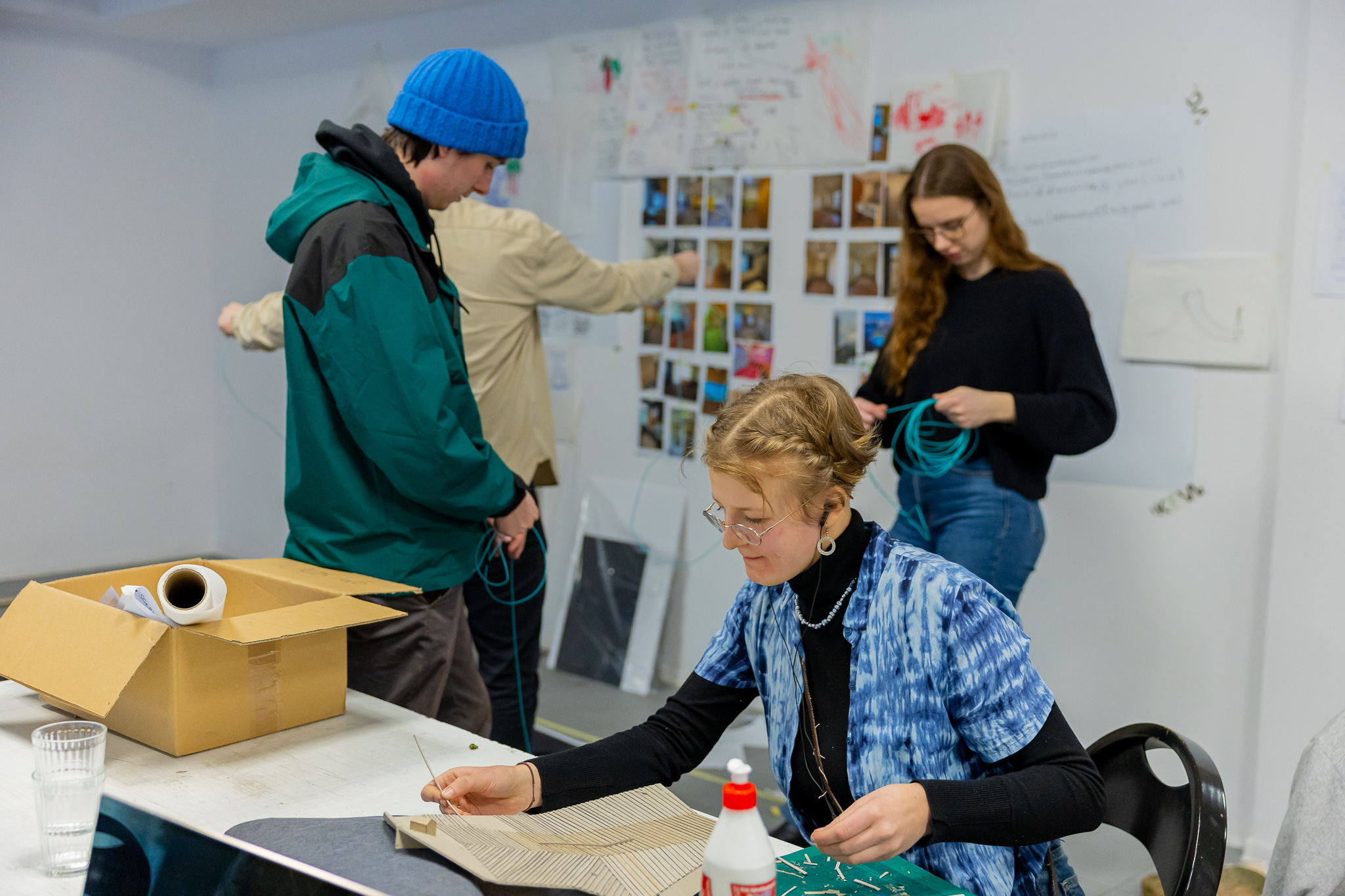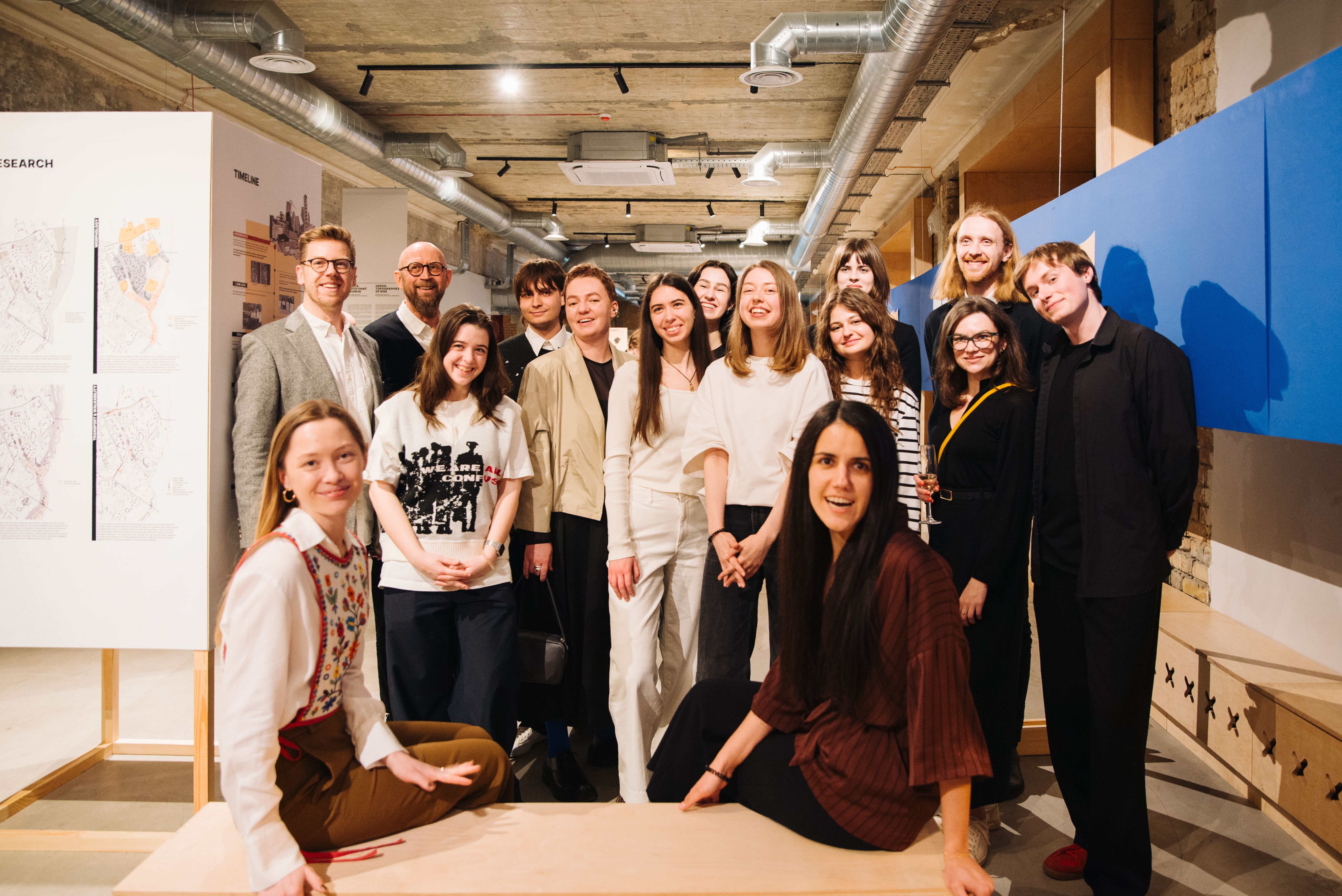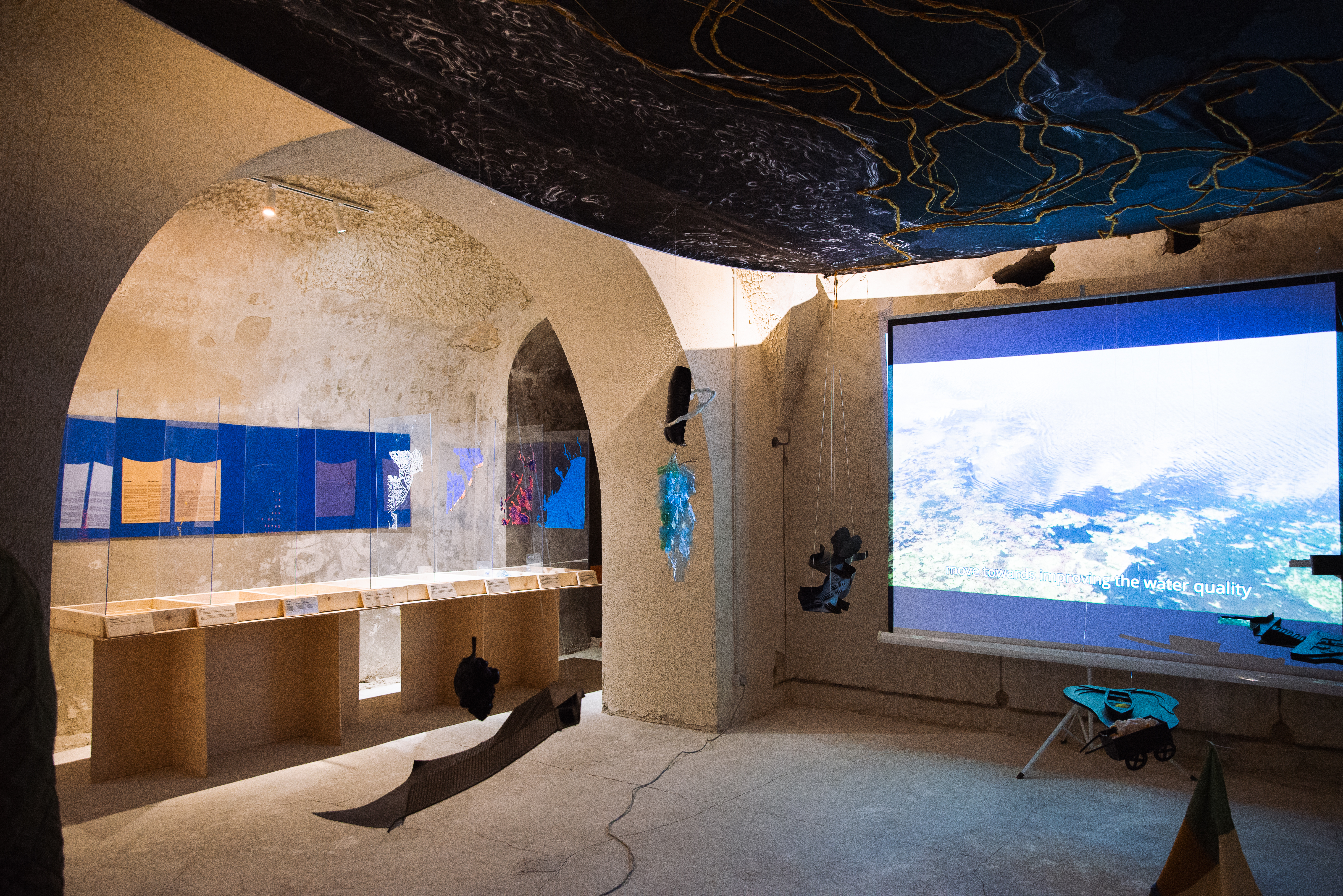(text is machine translated by DeepL)
The international workshop “Building Back Better” took place from January 20 to 31, 2025, marking its second edition. The Kharkiv School of Architecture organised it and also served as a pilot version of a new master’s program in Kharkiv, scheduled to launch in September 2025. The workshop ran simultaneously in two locations, Lviv and Warsaw, and brought together students and faculty from Ukraine and other European countries.

January 2025, workshop Building Back Better in Warsaw with FA VUT students. | Foto: Marcin Oliva Soto
An important component of this international partnership was the active participation of students and faculty from the Faculty of Architecture at Brno University of Technology, who collaborated with institutions such as the Kharkiv School of Architecture, Limerick University (Ireland), Warsaw University of Technology (Poland), and other independent students and educators from Ukraine. The aim was to create space for students and teachers to meet, discuss ideas for transforming Ukrainian communities and cities, and build a community around the school and the upcoming master’s program. The workshop drew over 150 participants, comprising students, educators, researchers, and representatives from NGOs.

BBB exhibition opening in Kyiv. | Photo: Zlatoslava Kryshtafovych
Participants, including the team from FA BUT Brno, worked across four scales to examine various risks and damages, both physical and emotional, in Odesa and the surrounding region:
Sea: Rethinking the Black Sea as an active agent with its history, ecosystem, and cultural dimension.
City: Exploring Odesa through its emotional dimension and residents’ personal stories (in Lviv) and its physical structure (in Warsaw), perceiving Odesa as a “city in between”—both material and emotional. Tools such as storytelling and collage methods were used.
District/Neighbourhood: Investigating the interconnection between communities and urban space, focusing on the problem of enclosed areas and fences as social barriers (e.g., in the Arcadia and Peresyp districts), and seeking ways to open these spaces and make them publicly accessible.
Home: Examining the transformation of “home,” including its relationship to the city and internal sense of belonging. Gathering personal stories from residents and their perceptions of home during wartime – crucial for future reconstruction.

The exhibition took place in Odesa, showcasing works from the Warsaw workshop. | Foto: Zlatoslava Kryshtafovych
For the Brno team, this meant a journey to explore Odesa’s future in the context of ongoing war and a deeper understanding of urban recovery and resilience. The workshop was supported by the UN-Habitat office in Ukraine, which sees the project as key for capacity-building in education and supporting Ukrainian communities in discussions about reconstruction.
The Exhibition and the French Pavilion
The outcomes of the “Building Back Better” workshop, focused on Odesa, are part of the exhibition in the French Pavilion at the Biennale Architettura 2025 in Venice. The French Pavilion, themed “Living With / Vivre Avec”, explores how architecture can adapt to contemporary challenges, including environmental, social, and urban issues. One section of the pavilion is dedicated to the reconstruction of post-conflict and crisis areas, featuring the work of students and faculty from universities involved in the workshop, including the Faculty of Architecture at the BUT Brno.
.jpeg)
From the installation in Venice.
The student project exhibition from the workshop, titled “Odesa: Topographies of Risk. Sustainable Recovery” through Learning and Cooperation, was previously held in Kyiv and Odesa before the materials were moved to Venice. The goal of this exhibition is not to offer ready-made solutions but to provoke city residents to reflect and initiate discussions about urban transformation.
Presenting the workshop’s results on the international stage of the Biennale provides a platform to share Ukrainian perspectives and reconstruction dialogues with the global community. It demonstrates how architecture schools and professionals envision the future in an unstable world, and how architecture can serve as a tool for responding to radical urban changes. Workshops like “Building Back Better” are essential tools for building community, strengthening student capabilities, and shaping future architects as community mediators. Participants gained a deeper understanding of urban resilience and recovery and examined the role of architecture in times of crisis.
The Biennale Architettura 2025 runs from May 10 to November 23, 2025.
The NY TIMES report. Have you read about the Warsaw workshop yet? Building Back Better: A Journey into Odesa's FutureTake a look at the workshop on YOUTUBE Odesa: Topographies of Risk.
Press release
International Workshop ‘Building Back Better’ Showcased at the French Pavilion, Venice Architecture Biennale 2025
As part of the 19th International Architecture Exhibition, Biennale Architettura 2025, the results of the international workshop "Building Back Better: An International Workshop exploring solutions for the sustainable rebuilding of Ukraine" are being presented at the French Pavilion. This year’s workshop focused on the city of Odesa and the Black Sea coastal region, showcasing innovative approaches to sustainable reconstruction in the context of ongoing war. Students and faculty from the Faculty of Architecture at Brno University of Technology also participated, contributing their proposals and expertise.The international workshop “Building Back Better” took place from January 20 to 31, 2025, marking its second edition. The Kharkiv School of Architecture organised it and also served as a pilot version of a new master’s program in Kharkiv, scheduled to launch in September 2025. The workshop ran simultaneously in two locations, Lviv and Warsaw, and brought together students and faculty from Ukraine and other European countries.

January 2025, workshop Building Back Better in Warsaw with FA VUT students. | Foto: Marcin Oliva Soto
An important component of this international partnership was the active participation of students and faculty from the Faculty of Architecture at Brno University of Technology, who collaborated with institutions such as the Kharkiv School of Architecture, Limerick University (Ireland), Warsaw University of Technology (Poland), and other independent students and educators from Ukraine. The aim was to create space for students and teachers to meet, discuss ideas for transforming Ukrainian communities and cities, and build a community around the school and the upcoming master’s program. The workshop drew over 150 participants, comprising students, educators, researchers, and representatives from NGOs.

BBB exhibition opening in Kyiv. | Photo: Zlatoslava Kryshtafovych
Participants, including the team from FA BUT Brno, worked across four scales to examine various risks and damages, both physical and emotional, in Odesa and the surrounding region:
Sea: Rethinking the Black Sea as an active agent with its history, ecosystem, and cultural dimension.
City: Exploring Odesa through its emotional dimension and residents’ personal stories (in Lviv) and its physical structure (in Warsaw), perceiving Odesa as a “city in between”—both material and emotional. Tools such as storytelling and collage methods were used.
District/Neighbourhood: Investigating the interconnection between communities and urban space, focusing on the problem of enclosed areas and fences as social barriers (e.g., in the Arcadia and Peresyp districts), and seeking ways to open these spaces and make them publicly accessible.
Home: Examining the transformation of “home,” including its relationship to the city and internal sense of belonging. Gathering personal stories from residents and their perceptions of home during wartime – crucial for future reconstruction.

The exhibition took place in Odesa, showcasing works from the Warsaw workshop. | Foto: Zlatoslava Kryshtafovych
For the Brno team, this meant a journey to explore Odesa’s future in the context of ongoing war and a deeper understanding of urban recovery and resilience. The workshop was supported by the UN-Habitat office in Ukraine, which sees the project as key for capacity-building in education and supporting Ukrainian communities in discussions about reconstruction.
The Exhibition and the French Pavilion
The outcomes of the “Building Back Better” workshop, focused on Odesa, are part of the exhibition in the French Pavilion at the Biennale Architettura 2025 in Venice. The French Pavilion, themed “Living With / Vivre Avec”, explores how architecture can adapt to contemporary challenges, including environmental, social, and urban issues. One section of the pavilion is dedicated to the reconstruction of post-conflict and crisis areas, featuring the work of students and faculty from universities involved in the workshop, including the Faculty of Architecture at the BUT Brno.
.jpeg)
From the installation in Venice.
The student project exhibition from the workshop, titled “Odesa: Topographies of Risk. Sustainable Recovery” through Learning and Cooperation, was previously held in Kyiv and Odesa before the materials were moved to Venice. The goal of this exhibition is not to offer ready-made solutions but to provoke city residents to reflect and initiate discussions about urban transformation.
Presenting the workshop’s results on the international stage of the Biennale provides a platform to share Ukrainian perspectives and reconstruction dialogues with the global community. It demonstrates how architecture schools and professionals envision the future in an unstable world, and how architecture can serve as a tool for responding to radical urban changes. Workshops like “Building Back Better” are essential tools for building community, strengthening student capabilities, and shaping future architects as community mediators. Participants gained a deeper understanding of urban resilience and recovery and examined the role of architecture in times of crisis.
The Biennale Architettura 2025 runs from May 10 to November 23, 2025.
The NY TIMES report. Have you read about the Warsaw workshop yet? Building Back Better: A Journey into Odesa's FutureTake a look at the workshop on YOUTUBE Odesa: Topographies of Risk.
Press release
| Inserted by: | Tran Lucie |
|---|---|
| Inserted | |
| Last updated |